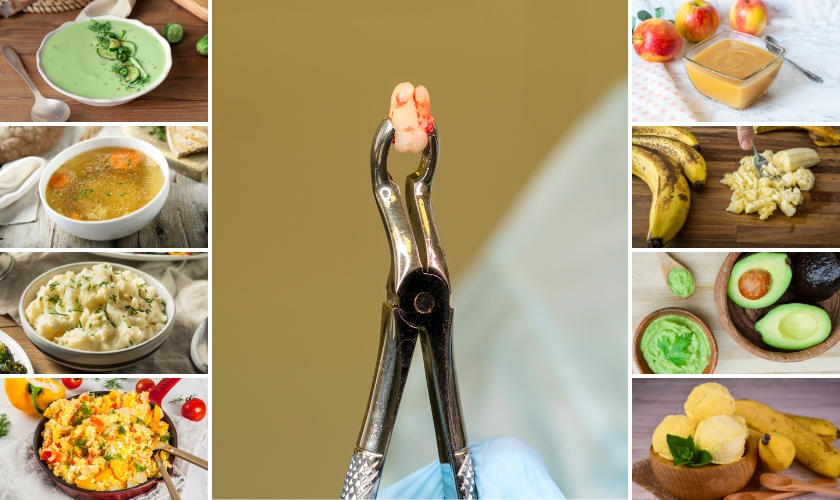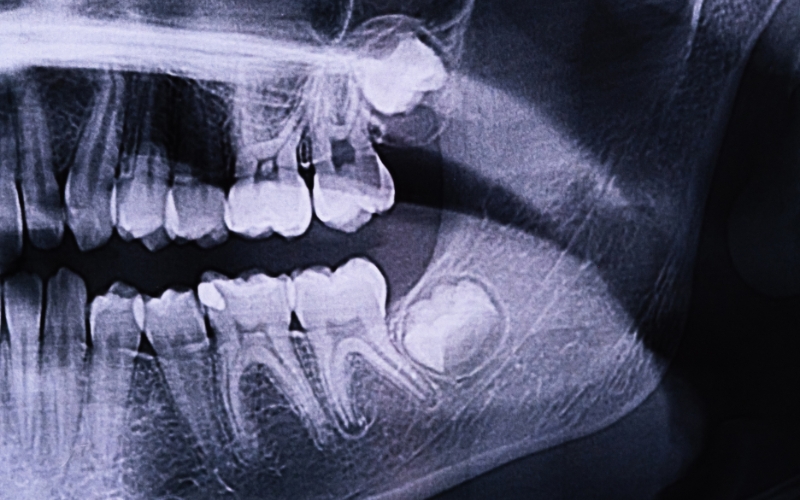


Congratulations on completing your wisdom teeth extraction! While the procedure is done, the road to recovery has just begun. A crucial aspect of ensuring a smooth recovery is your diet. In the initial days post-extraction, it’s important to focus on soft foods that are gentle on your healing mouth. Fortunately, there are plenty of delicious and nutritious options available. It’s normal to experience some soreness after wisdom teeth removal, so opting for soft foods like soups, yogurt, and ice cream can aid in easing discomfort and minimizing the risk of infections or complications during this healing period.
Wisdom teeth, also known as third molars, typically develop in each corner at the back of your mouth. Each year, nearly 5 million wisdom tooth extractions are performed in the United States.
Recovery from this procedure can range from 3 days to 2 weeks. During this period, it is crucial to consume soft foods that are rich in vitamins, minerals, and energy. This dietary approach helps achieve several essential goals:
1. Protecting natural blood clots from dislodging
2. Preventing food particles or debris from becoming lodged in the extraction sites
3. Lowering the risk of infections or complications like dry sockets
4. Reducing swelling
5. Providing necessary nourishment
6. Accelerating the healing process
Continue reading to explore a list of 15 recommended soft foods to eat after wisdom teeth removal, along with foods that should be avoided.
Delicious and Nutritious 15 Soft Food Options
After wisdom teeth removal, your mouth will heal and be sensitive. Sticking to soft foods for the first few days is important to minimize discomfort and promote healing. Here are some great options to consider:
1. Blended soups
Blended soups like tomato or pumpkin are ideal during the initial five days after wisdom teeth removal. They are easy to consume without chewing, reducing the risk of irritating surgical sites. These soups often contain nutrient-rich vegetables and legumes, providing essential micronutrients crucial for recovery. Moreover, soups contribute to hydration, which is vital post-surgery.
To prevent irritation, it’s important to ensure soups are served lukewarm or cold; hot temperatures can aggravate wounds. Additionally, blending vegetable-based soups thoroughly until smooth helps avoid any undesirable chunks.
2. Broths
Similar to soups, broths are a valuable source of nourishment and hydration during the initial days following surgery.
Bone broth is prepared by simmering bones and connective tissues sourced from turkeys, chickens, lambs, pigs, cows, or fish. It is rich in vitamins, minerals, and is known for its health benefits. Additionally, bone broth contains amino acids that may aid in reducing inflammation.
To prevent irritation to the surgical site, it’s essential to consume broth at lukewarm or cold temperatures, similar to soups. This ensures optimal comfort and supports the healing process effectively.
3. Greek yogurt
Greek yogurt is a nutritious, smooth, and creamy food that can provide soothing relief and numbing effects after oral surgery. It is abundant in protein, vitamins, and minerals like calcium and zinc, which are essential for healing.
According to a previous research review, high-protein foods play a significant role in accelerating the recovery process. Adequate intake of zinc also supports wound healing. However, it’s important to note that additional zinc consumption may not offer extra benefits if your dietary needs are already met.
4. Mashed potatoes
Mashed potatoes, made from root vegetables, can provide comfort following wisdom teeth removal. They are dense in calories and nutrients, crucial for the recovery period when energy needs are slightly elevated post-surgery.
Ensure the mashed potatoes are thoroughly smooth without any lumps before consumption. Adding butter, milk, or water can aid in achieving a smoother consistency.
To avoid irritation to the wound, it’s advisable to consume them lukewarm rather than hot.
5. Scrambled eggs
Scrambled eggs are an excellent semisoft option when you begin to reintroduce chewing after oral surgery. They provide high-quality protein along with essential vitamins and minerals such as vitamins A and B12, zinc, iron, and selenium. These nutrients play crucial roles in supporting a healthy immune system and promoting effective wound healing.
6. Applesauce
Apples are hard and crunchy, which isn’t ideal immediately after wisdom teeth removal.
Choosing applesauce can boost your fruit intake within the first 24 hours post-surgery. It’s packed with vitamins B, C, and E, as well as copper.
Typically made from pureed apples without skins and cores, applesauce may have reduced nutritional content compared to whole apples, which contain vitamins, minerals, and fiber in their skin.
However, skinless apples still offer a good source of vitamin C, which may:
- Reduce inflammation and pain
- Boost your immune system
- Enhance fibroblast migration and wound closure
7. Mashed bananas
Mashed bananas have a soft texture that makes them easy to chew, savor, and swallow as you begin to chew gradually after oral surgery.
Bananas are highly nutritious, offering a range of vitamins and minerals, including potassium, vitamin B6, manganese, and folate.
Further, mashing bananas can soften their texture even more, reducing the risk of discomfort.
8. Banana ice cream
Banana ice cream offers a soothing effect due to its coldness, which can be beneficial for the extraction wound. Unlike regular ice cream, which tends to be high in sugar and fat, banana ice cream serves as a healthier and tasty homemade alternative.
How to Make Banana Ice Cream:
Ingredients:
- 3–4 bananas, peeled
- a splash of your preferred milk, such as dairy, almond, or oat
Instructions:
- Place the peeled bananas in the freezer for 3–4 hours or overnight.
- Slice the frozen bananas.
- Put the banana slices in a blender and add milk.
- Blend until the mixture achieves a thick, smooth consistency.
- Enjoy your banana ice cream!
9. Avocado
Avocados stand out among fruits for their low carbohydrate content and high healthy fat content. They’re a valuable source of vitamins K and C and potassium, and offer numerous health benefits. Avocados’ smooth, creamy texture makes them ideal for consumption during oral surgery recovery. smooth, creamy texture makes them ideal for consumption during oral surgery recovery.
During your recovery period, opting for guacamole or whipped/mashed avocados is recommended.
10. Smoothies
Smoothies offer a convenient way to enhance your nutrient intake when solid foods are difficult to consume. They are versatile, allowing customization according to your taste preferences and nutritional needs.
For instance, incorporating Greek yogurt or protein powder into your smoothies can significantly increase protein content, while fruit-rich varieties can boost fiber intake. To ensure a balanced and nutritious smoothie, blend together fruits, vegetables, and a protein source.
During your recovery phase, it’s advisable to avoid fruits with seeds like strawberries and blackberries. Seeds may lodge into the extraction site, potentially causing infections or other complications.
11. Hummus
Hummus, a popular Middle Eastern dip and spread, has gained global popularity for its nutritional benefits.
It’s a rich source of healthy fats, vitamins, minerals, and protein, making it an excellent choice for those recovering from wisdom teeth removal.
You can easily prepare hummus at home by blending chickpeas, tahini, olive oil, garlic, and lemon in a food processor. Alternatively, premade hummus is readily available in most supermarkets.
During your recovery period, it’s important to avoid consuming hummus with chips or pita bread due to their crunchy texture, which can potentially harm the surgical sites. However, enjoying hummus on its own remains a delicious and nutritious option.
12. Cottage cheese
Cottage cheese is a low-calorie food that is rich in protein, vitamins, and minerals, making it a nutritious choice.
Its soft and creamy texture can ease consumption as you begin to reintroduce chewing after oral surgery.
You can incorporate cottage cheese into your diet by adding it to scrambled eggs, blending it into smoothies, or enjoying it on its own for a wholesome meal option.
13. Instant oatmeal
Instant oatmeal is a highly nutritious option among foods, known for its filling fiber content and rich array of vitamins and minerals.
Due to its slightly chewy and sticky texture, it is advisable to postpone consumption until at least three days after wisdom teeth removal. Instant oats are preferable over chewier varieties like steel cut oats during this recovery period.
To prevent any potential irritation, ensure that the oatmeal has cooled adequately before consuming it.
14. Mashed pumpkin
Mashed, cooked pumpkin is an excellent choice post-wisdom teeth removal due to its soft, mushy texture that facilitates easy chewing and swallowing without irritation.
Despite being commonly mistaken for a vegetable, pumpkin is botanically a fruit. It boasts a wealth of vitamins A, C, and E, along with minerals like potassium, which contribute to its nutritional value.
Similar to mashed potatoes or bananas, ensure the pumpkin is thoroughly mashed and cooled before consumption to maximize comfort and ease during recovery.
15. Salmon
Salmon is considered one of the healthiest fish options and is particularly beneficial as you transition to chewing during your post-surgery recovery.
Rich in protein and healthy fats like omega-3 fatty acids, salmon is known to support wound healing by potentially reducing inflammation, particularly beneficial if your omega-3 levels are low.
Foods to avoid
During your recovery from wisdom tooth removal, it’s crucial to avoid certain foods that can irritate the extraction sites or disrupt healing:
- Spicy foods should be avoided as they can cause discomfort and irritation.
- Crunchy and crumbly foods like chips or cookies can get stuck in the wound and potentially lead to infections or complications.
- Grains, seeds, and nuts are best avoided as they may also get lodged in the wound and hinder healing.
- Chewy foods should be avoided initially to minimize the risk of accidentally biting your cheeks, lips, or tongue, especially while your mouth is still numb.
- Alcohol should be completely avoided during recovery as it can irritate the wound and may interact with any medications you’re taking.
- Using a straw is not recommended as it creates suction in the mouth, which increases the risk of developing a dry socket.
Beyond Recovery: Maintaining Oral Health
Once you’ve fully recovered from wisdom teeth extraction, it’s crucial to maintain good oral hygiene practices to prevent future complications. Here are some tips:
- Brush and Floss Regularly: Brush your teeth twice a day and floss once a day to remove plaque and food particles that can contribute to infection.
- Regular Oral Health Checkups: Schedule regular checkups with your oral surgeon for professional cleanings and to monitor your oral health.
- Healthy Diet: Maintain a healthy diet rich in fruits, vegetables, and whole grains to support overall well-being and oral health.
By following these tips and prioritizing a healthy lifestyle, you can ensure a smooth recovery from wisdom teeth extraction and maintain a healthy smile for years to come.
Consulting with a qualified oral surgeon specializing in wisdom teeth extraction in Beverly Hills, CA, is essential for personalized guidance and a successful recovery process.




